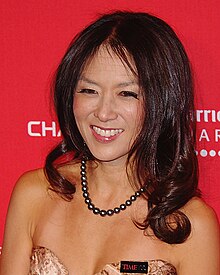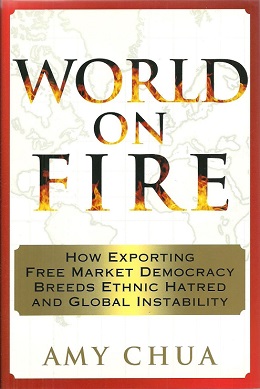
World on Fire: How Exporting Free Market Democracy Breeds Ethnic Hatred and Global Instability is a 2003 book by American legal scholar Amy Chua. It is an academic study of ethnic and sociological divisions in the economic and political systems of various societies. The book discusses the concept of "market-dominant minorities", which it defines as ethnic minority groups who, under given market conditions, tend to prosper, flourish, and dominate economically, often significantly, over other, often ethnic majority groups in the country.
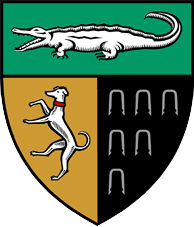
Yale Law School (YLS) is the law school of Yale University, a private research university in New Haven, Connecticut. It was established in 1824. The 2020–21 acceptance rate was 4%, the lowest of any law school in the United States. Its yield rate of 87% is also consistently the highest of any law school in the United States.

Susan Choi is an American novelist.

A helicopter parent is a term for a parent who is overattentive and overly fearful of a child's experiences and problems, particularly outside the home and at educational institutions. Helicopter parents are so named because, like helicopters, they "hover overhead", overseeing every aspect of their child's life. A helicopter parent is also known to strictly supervise their children in all aspects of their lives, including in social interactions.
Stereotypes of East Asians in the United States are ethnic stereotypes found in American society about first-generation immigrants and their American-born descendants and citizenry with East Asian ancestry or whose family members who recently emigrated to the United States from East Asia, as well as members of the Chinese diaspora whose family members emigrated from Southeast Asian countries. Stereotypes of East Asians, analogous to other ethnic and racial stereotypes, are often erroneously misunderstood and negatively portrayed in American mainstream media, cinema, music, television, literature, video games, internet, as well as in other forms of creative expression in American culture and society. Many of these commonly generalized stereotypes are largely correlative to those that are also found in other Anglosphere countries, such as in Australia, Canada, New Zealand, and the United Kingdom, as entertainment and mass media are often closely interlinked between them.
Jed L. Rubenfeld is an American legal scholar and professor of law at Yale Law School. He is an expert on constitutional law, privacy, and the First Amendment. He joined the Yale faculty in 1990 and was appointed to a full professorship in 1994. Rubenfeld has served as a United States representative at the Council of Europe and has taught as a visiting professor at both the Stanford Law School and the Duke University School of Law. He is also the author of two novels, including the million-copy bestseller, The Interpretation of Murder.
Rhonda Byrne is an Australian television writer and producer. Her book The Secret is based on the belief of the law of attraction, which claims that thoughts can change a person's life directly. She wrote several sequels to the book, including The Power and The Magic.

Day of Empire: How Hyperpowers Rise to Global Dominance - and Why They Fall is a 2007 book by Yale Law School professor Amy Chua.

Leon Ong Chua is an American electrical engineer and computer scientist. He is a professor in the electrical engineering and computer sciences department at the University of California, Berkeley, which he joined in 1971. He has contributed to nonlinear circuit theory and cellular neural network theory.
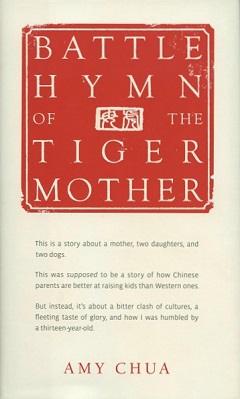
Battle Hymn of the Tiger Mother is a book by American author and law professor Amy Chua that was published in 2011. It quickly popularized the concept and term "tiger mother".
Tiger parenting is a form of strict parenting, whereby parents are highly invested in ensuring their children's success. Specifically, tiger parents push their children to attain high levels of academic achievement or success in high-status extracurricular activities such as music or sports. The term "tiger mother" was brought to public attention by Yale Law School professor Amy Chua in her 2011 memoir Battle Hymn of the Tiger Mother.

Katharine Moana Birbalsingh is a New Zealand-born British-Canadian teacher and education reform advocate who is the founder and head teacher of Michaela Community School, a free school established in 2014 in Wembley Park, London. Politically, she identifies herself as a small-c conservative.

The Triple Package: How Three Unlikely Traits Explain the Rise and Fall of Cultural Groups in America is a book published in 2014 by two professors at Yale Law School, Amy Chua and her husband, Jed Rubenfeld. Amy Chua is also the author of the 2011 international bestseller, Battle Hymn of the Tiger Mother.
Reva Seth is a Canadian journalist, author, lawyer, strategic communications consultant, speaker, coach and entrepreneur.
Logan Beirne is an American entrepreneur, writer, and academic. He teaches at Yale Law School and his debut book, Blood of Tyrants: George Washington and the Forging of the Presidency, won the Colby Award for best military history. He speaks on history and politics at conferences and universities across the United States and appears regularly in the media.
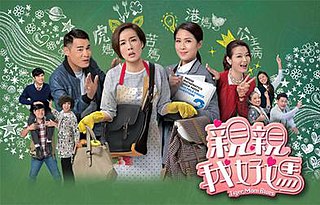
Tiger Mom Blues is a 2017 Hong Kong television drama produced by Kwan Wing-chung and TVB. It premiered on TVB Jade in Hong Kong and Astro On Demand in Malaysia on 6 February 2017. The series covers the tiger mother phenomenon, where children are deeply influenced by a strict and autocratic parenting style. The final episode aired on 3 March 2017, totalling 20 episodes. It stars Elena Kong, Ben Wong, Sharon Chan and Michelle Yim.
A tiger mother is a term for a strict or demanding mother who controls her children and pushes them to be academically successful.
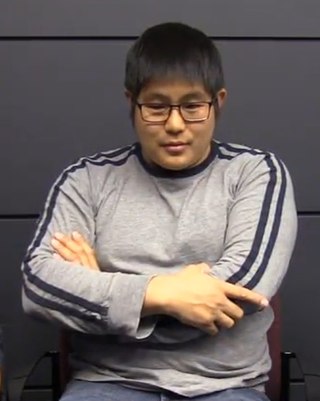
Michael (Mike) Lew is a Chinese-American playwright most renown for his works Teenage Dick, and Tiger Style!. He acquired his B.A. at Yale University in 2003, double majoring in Theatre (directing) and English (writing), then proceeded to get his artist diploma in playwriting at the Juilliard school in 2003. He is the co-director of Ma-Yi Writers Lab, the largest theatre company in the United States that aims to help Asian American writers produce and develop plays, and is on a 3-year fellowship at Ma-Yi through the Mellon Foundation.

Hokkien, Hoklo (Holo), and Minnan people are found in the United States. The Hoklo people are a Han Chinese subgroup with ancestral roots in Southern Fujian and Eastern Guangdong, particularly around the modern prefecture-level cities of Quanzhou, Zhangzhou, and Xiamen, along with the Chaoshan region. They are also known by various endonyms, or other related terms such as Hoklo people (河洛儂), Banlam (Minnan) people, Hokkien people or Teochew people (潮州人;Tiê-tsiu-lâng). These people usually also have roots in the Hokkien diaspora in Taiwan, the Philippines, Malaysia, Indonesia, Singapore, Burma, Thailand, Vietnam, and Cambodia.

The Choke Artist is the 2012 autobiography of David Yoo. His fourth book, it was published eight years after his first effort “Girls For Breakfast”. The book was a selection for the Massachusetts “Must Read” list and a 2013 Finalist for the Massachusetts Book Award.
